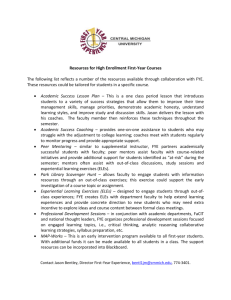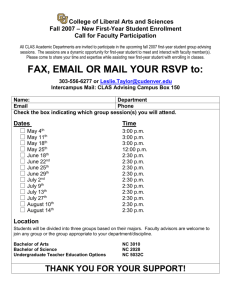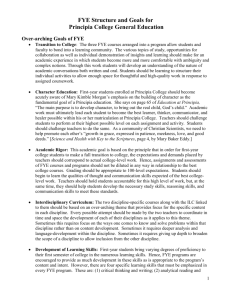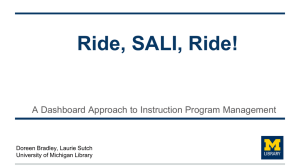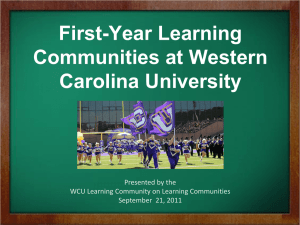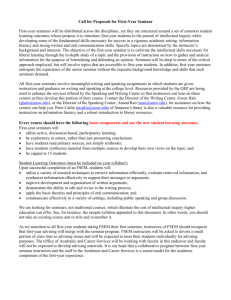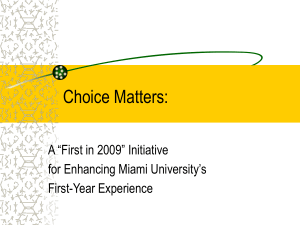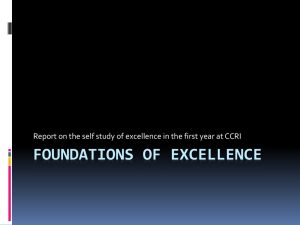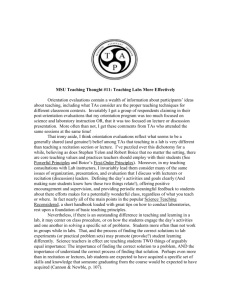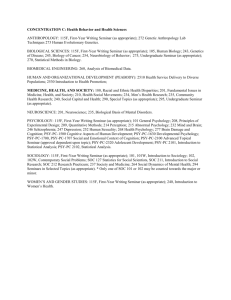Trends and Issues
advertisement
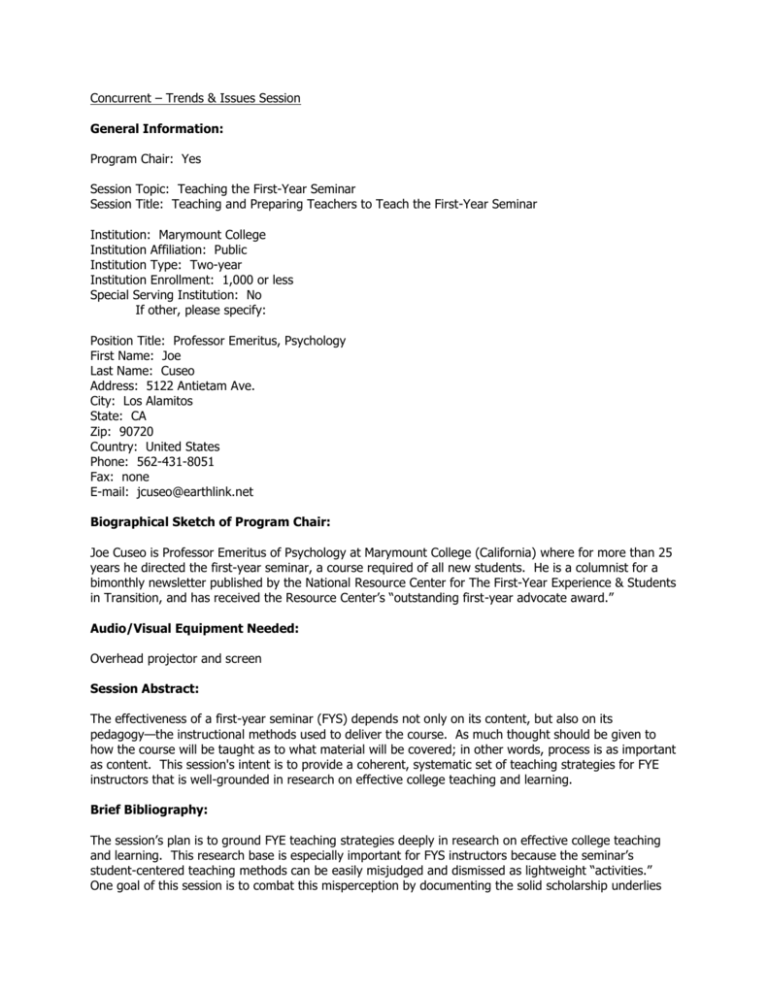
Concurrent – Trends & Issues Session General Information: Program Chair: Yes Session Topic: Teaching the First-Year Seminar Session Title: Teaching and Preparing Teachers to Teach the First-Year Seminar Institution: Marymount College Institution Affiliation: Public Institution Type: Two-year Institution Enrollment: 1,000 or less Special Serving Institution: No If other, please specify: Position Title: Professor Emeritus, Psychology First Name: Joe Last Name: Cuseo Address: 5122 Antietam Ave. City: Los Alamitos State: CA Zip: 90720 Country: United States Phone: 562-431-8051 Fax: none E-mail: jcuseo@earthlink.net Biographical Sketch of Program Chair: Joe Cuseo is Professor Emeritus of Psychology at Marymount College (California) where for more than 25 years he directed the first-year seminar, a course required of all new students. He is a columnist for a bimonthly newsletter published by the National Resource Center for The First-Year Experience & Students in Transition, and has received the Resource Center’s “outstanding first-year advocate award.” Audio/Visual Equipment Needed: Overhead projector and screen Session Abstract: The effectiveness of a first-year seminar (FYS) depends not only on its content, but also on its pedagogy—the instructional methods used to deliver the course. As much thought should be given to how the course will be taught as to what material will be covered; in other words, process is as important as content. This session's intent is to provide a coherent, systematic set of teaching strategies for FYE instructors that is well-grounded in research on effective college teaching and learning. Brief Bibliography: The session’s plan is to ground FYE teaching strategies deeply in research on effective college teaching and learning. This research base is especially important for FYS instructors because the seminar’s student-centered teaching methods can be easily misjudged and dismissed as lightweight “activities.” One goal of this session is to combat this misperception by documenting the solid scholarship underlies FYS teaching practices, demonstrating that they are not fun or engaging activities, but bona fide instructional strategies intentionally designed to promote deep learning. Detailed Summary: The effectiveness of a first-year seminar (FYS) depends not only on its content, but also on its pedagogy—the instructional methods used to deliver the course. As much thought should be given to how the course will be taught as to what material will be covered; in other words, process is as important as content. This session's goal is to provide a coherent, systematic set of teaching strategies for FYE instructors that is well-grounded in research on effective college teaching and learning. The session is intended to provide instructors with more than a series of superficial teaching “tips,” which focus exclusively on the how of it—teaching mechanics; it also includes examination of the why of it— research-based reasons for the effectiveness of the strategies that are recommended. Including discussion of the research and theory that support recommended instructional practices serves to highlight teaching as a form of scholarship, elevates the academic credibility of the FYS, and validates the efforts of the student-centered instructors who teach the course. Moreover, if instructors share the rationale for their teaching strategies with their students, they will gain a better understanding of the educational purpose behind the practices, which should increase the likelihood that students will respond with greater effort and enthusiasm. The instructional strategies cited in this manuscript have been drawn primarily from three sources: (a) research on instructional improvement conducted by scholars in the field of faculty development, (b) research on human learning, cognition, and motivation, and (c) research on the characteristics and behaviors of college instructors that have been empirically associated with student perceptions of effective teaching and self-reported learning. Implications/Adaptability for Practice: Unlike traditional college courses, where it is assumed that faculty with advanced degrees in their disciplines already know what and how to teach the subject matter, instructor training and development is a critical component of an effective FYE program because none of its instructors have received graduate training in how to teach an FYE course, nor have they earned an advanced educational degree in the subject of the first-year experience or the field of student success. Thus, instructor development for a FYE takes on greater significance than it does for discipline-based courses taught by disciplinetrained faculty. FYE instructor training has the potential to be much more than an ancillary activity; instead, it has the capacity to fill an instructor-preparation void and can serve as the centerpiece of an effective training-and-development program for all course instructors. The instructional strategies in this session are organized around three key student-centered “connections” that may be readily adapted for practice on any college campus, namely: (1) the student-instructor connection, (2) the student-course (subject) connection, and (3) the student-student (peer) connection. The strategies cited have the flexibility to be applied to any unit of the course, thus supplying instructors with a well-stocked arsenal of versatile strategies from which they may choose to deploy where and when they see fit. Additional Presenters: No
